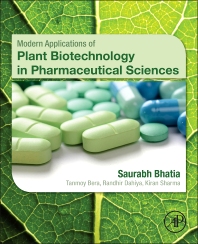Books in Pharmacology
Books in Pharmacology
Elsevier's Pharmacology collection studies how drugs interact with biological systems to improve health and treat disease. It covers pharmacodynamics, exploring drug effects on biology, and pharmacokinetics, studying how the body affects drugs. Branches like Pharmacogenetics. Essential for pharmacologists, this collection offers invaluable insights into drug interactions, efficacy, and safety, crucial for advancing drug development and improving patient outcomes.

Meyler's Side Effects of Drugs
The International Encyclopedia of Adverse Drug Reactions and Interactions- 16th Edition
- October 15, 2015
- Jeffrey K. Aronson
- English

Stem Cell and Gene Therapy for Cardiovascular Disease
- 1st Edition
- August 21, 2015
- Emerson c. Perin + 3 more
- English

Cytochrome P450 Function and Pharmacological Roles in Inflammation and Cancer
- 1st Edition
- Volume 74
- July 23, 2015
- English

Modern Applications of Plant Biotechnology in Pharmaceutical Sciences
- 1st Edition
- July 22, 2015
- Saurabh Bhatia + 3 more
- English

Research Regulatory Compliance
- 1st Edition
- June 14, 2015
- Mark A. Suckow + 1 more
- English

Anti-Angiogenesis Drug Discovery and Development
Volume 2- 1st Edition
- June 2, 2015
- Atta-ur Rahman + 1 more
- English

Recent Advances in Medicinal Chemistry, Volume 1
- 1st Edition
- June 2, 2015
- Atta-ur Rahman + 2 more
- English

Medicinal Chemistry of Anticancer Drugs
- 2nd Edition
- April 28, 2015
- Carmen Avendaño + 1 more
- English

Essential Pharmacokinetics
A Primer for Pharmaceutical Scientists- 1st Edition
- March 25, 2015
- Thorsteinn Loftsson
- English

TRP Channels as Therapeutic Targets
From Basic Science to Clinical Use- 1st Edition
- March 14, 2015
- Arpad Szallasi
- English